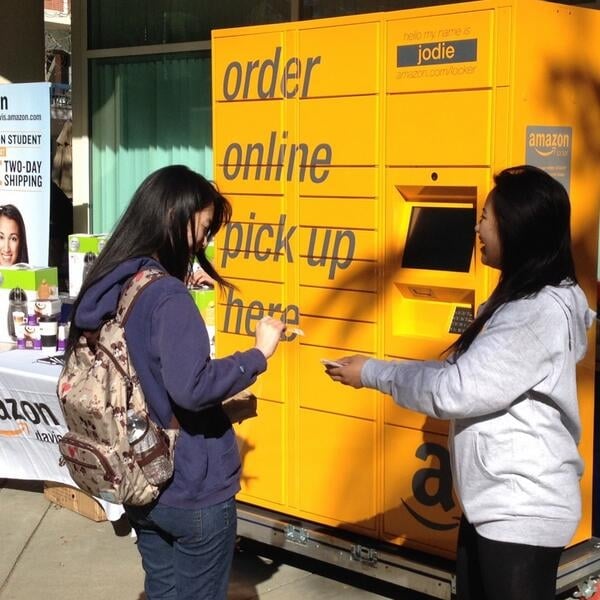You have /5 articles left.
Sign up for a free account or log in.

An Amazon locker at the University of California at Davis.
UC-Davis Dateline
Purdue University will become the next Amazon Campus, the institution announced on Wednesday, giving students a priority lane to the retail behemoth through the Purdue Student Store.
Beyond Amazon's impact on campus bookstores' bottom lines, the company's presence in higher education has mostly been felt in the post office, as students opt to order rental or used books online. With the expansion of its Amazon Campus program, the company is aiming for more visibility on college campuses.
The co-branded program at Purdue is the second of its kind. The University of California at Davis announced a pilot with Amazon last November, and the company has expansion plans in the works, a spokeswoman said in an email.
In addition to offering priority shipping options, Amazon will staff locations on campus where students can pick up their orders and drop off rented textbooks when they are due. UC-Davis, in comparison, uses Amazon’s bright yellow automated lockers. Both benefits are expected to roll out during the next year at Purdue, according to a press release.
As part of its deal with Amazon, UC-Davis collects “a little more than 2 percent of most purchases” from the university-branded store. In the first two academic quarters since the launch of the pilot, the partnership has netted the university $139,000, much of which has gone toward funding short-term financial aid and textbook scholarships.
Purdue will also receive “a percentage of eligible sales,” and will invest the revenue in “student affordability and accessibility initiatives,” according to Wednesday’s announcement.
While their arrangements with Amazon may appear similar, UC-Davis and Purdue are far apart when it comes to the bookstore services they provide to students. Jason Lorgan, director of UC-Davis Stores, said the university was one of the first in the country to turn its website into a search-engine-like portal where students can compare the bookstore's prices to online retailers such as Half.com, Textbooks.com and, yes, Amazon.
Since the bookstore began showing other retailers’ prices back in 2010, Lorgan said, inviting Amazon to directly compete on textbook sales was not a “radical change.”
“Before we entered this pilot, it was no secret Amazon was one of the main sources of textbooks for students,” Lorgan said in an interview. “We feel like our mission is to provide the tools of education at the lowest cost, even if that’s not through us.”
In some cases, the university bookstore still beats the competition. A required textbook in an African American and African Studies course offered this fall can be rented from the university for $13.45, while Follett comes closest at $18.63. Amazon does, however, offer a new version of the book for about $5 less than the campus bookstore. At Purdue, the company estimates those kinds of savings for students will add up to $6 million a year.
Besides, Lorgan added, the bookstore doesn't compete with Amazon on the myriad other products the retailer offers. UC-Davis is in the process of negotiating a five-year contract with Amazon, as its pilot is scheduled to end in September.
Purdue, meanwhile, doesn’t have a university-run bookstore, though several independent stores operate in the university’s vicinity.
Amazon’s expansion comes as a warning to other private bookstore operators, including Barnes & Noble, the embattled retailer that last year announced it would close one-third of its stores over the next decade. The chain runs bookstores on or near hundreds of college campuses.
Barnes & Noble declined to comment on Purdue’s announcement. Follett, which runs a bookstore a block away from Purdue’s campus, did not respond to a request for comment.
“It's a smart program for Amazon,” said Joseph J. Esposito, a digital media, software and publishing consultant, who predicted responses to the collaboration will depend “on which side of the table you are sitting on.”
“If you think that Amazon's customer service and low prices are entirely commendable, what's not to like?” Esposito said in an email. “If you are a university administrator, the possibility of getting some revenue for this is undoubtedly highly welcome. If you study Amazon's privacy policy and you are part of the university's task force on privacy, you may have some questions. If you think Amazon's market share is such that it gives Amazon too much influence over the flow of information in our society, you won't like this deal at all.”
Amazon has recently been locked in a dispute with the French publisher Hachette, which has accused the company of delaying book shipments over ebook pricing disagreements. The case has led to new questions about large retailers' ability to shape consumer patterns.
"The issue, in my opinion, is that at some point companies, even the best companies ..., begin to wield outsize influence over the economy and even over social policy," Esposito said. "I think Amazon deserves a close look by policy makers."




